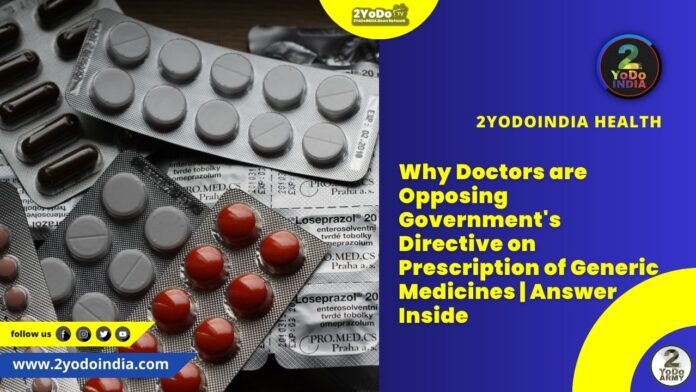National Medical Commission’s (NMC) recent directive to doctors to exclusively prescribe generic medicines to patients. As the debate rages on, doctors, medical associations, and healthcare bodies have united their voices, urgently appealing to both Union Health Minister Mansukh Mandaviya and Prime Minister Narendra Modi to reconsider and rescind the rule.
In the past week, at least three organizations have reach out to the government, urging a reevaluation and withdrawal of the directive.
Following the Indian Medical Association’s lead in opposing the policy change, the Association of Physicians of India, a body of consultant physicians and the Medico-Legal Society of India have also written to Mansukh Mandaviya and Narendra Modi, presenting their arguments against the directive.
What is National Medical Commission New Rule?
On 2nd August 2023, the NMC impose a directive mandating doctors to prescribe generic drugs instead of branded equivalents.
In case of non-compliance, they can be penalise.
For breaches, doctors could also receive warnings and mandatory participation in workshops and training sessions.
Persistent violations of the directive could further lead to the suspension of their licenses, as per an official notification by the NMC.
Generic medicines are the unbranded versions of drugs that have identical dosages, usage, side effects, administration routes, risks, safety, and potency as their branded counterparts.
For example, while Crocin and Dolo 650 are branded versions of a pain and fever reliever, their generic name is paracetamol.
Under NMC’s guidelines for generic medicine prescriptions, these medicines are define as products equivalent to their brand/reference-listed counterparts in terms of dosage form, strength, administration route, quality, performance characteristics, and intend use.
To ensure clarity and minimise misinterpretation, the National Medical Commission’s (NMC) recommends that prescriptions be legible, preferably written in all capital letters.
Typewritten and printed prescriptions are encourage to prevent errors.
The National Medical Commission’s has also supplied a prescription template for doctors to use in rational prescription writing.
So, apprehensions have arisen regarding the efficacy and quality of these generic drugs.
Critics who are majorly medical professionals and academicians in medical education institutions argue that their effectiveness and reliability may be compromise due to a lack of standardize testing and approval procedures.
They further contend that branded drugs offer greater assurance of quality.
Generic Medicines Vs Branded Medicines
Generally known, despite concerns about generic medications, their affordability remains a significant advantage.
Their lower prices result from the absence of patent protection and marketing expenses, making healthcare more accessible to the masses.
This shift in prescription practices could hold particular significance for chronic patients burdened by medical costs, the government holds.
Insurance companies could also save substantially, as high-price branded drugs contribute significantly to elevated healthcare premiums.
Indian Medical Association (IMA) has however argue that the directive to prescribe specific groups of drugs undermines comprehensive medical care and weakens medical professionals’ autonomy.
Despite being supportive of the intention behind the promotion of generic drugs, doctors have express apprehensions that the new directive could compromise the quality of care they can provide.
The mandate aims to make healthcare more affordable and grant greater access to essential medications for economically disadvantaged populations.
Dr Sharad Kumar Agarwal, National President, and Dr Anilkumar J Nayak, Secretary General, IMA jointly said
“The directive appears to shift decision-making power from medical practitioners to pharmacists or individuals in pharmacy settings. This shift may not align with the patients’ best interests, as it places a crucial treatment decision in the hands of non-medical personnel,”.
According to the Medico Legal Society of India, the directive to prescribe generic medicines is under scrutiny for potential violation of citizens’ fundamental rights under Article 21 of the Indian Constitution.
Many legal cases have establish that individuals possess the right to make decisions about their bodies and medical treatment without unwarranted state interference.
While the Indian Medical Association said less than 0.1% of the drugs manufacture in India are test for quality, the medico legal society warn that concerns arise due to potential compromise in quality control of generic drugs, leading to uncertain efficacy and liability for doctors.
The NMC’s lack of control over drug quality and pharmacy practices further adds to the debate.
Doctors have said that the availability of medicines in the Indian market is a challenge.




